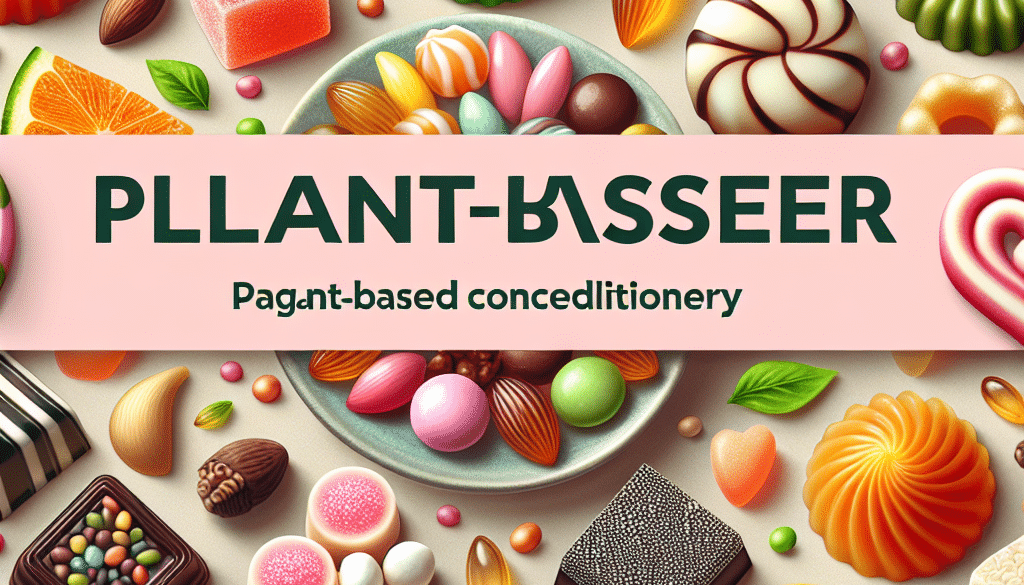Plant-based Sugar Confectionery Hits the Sweet Spot
-
Table of Contents
- Plant-Based Sugar Confectionery: A Sweet Revolution in Snacking
- The Rise of Plant-Based Confectionery
- Ingredients That Make a Difference
- Environmental and Ethical Benefits
- Market Trends and Consumer Demand
- Case Studies: Success Stories in Plant-Based Sweets
- Challenges and Opportunities
- Conclusion: The Future Is Sweet and Plant-Based
- ETChem: Meeting Your Plant-Based Protein Needs
Plant-Based Sugar Confectionery: A Sweet Revolution in Snacking

The confectionery industry has long been dominated by traditional sweets, often loaded with animal-based ingredients and refined sugars. However, a new trend is emerging that caters to the health-conscious and ethically-minded consumer: plant-based sugar confectionery. This shift is not just a fad but a reflection of a growing demand for products that are both delicious and sustainable. In this article, we’ll explore why plant-based sugar confectionery is hitting the sweet spot in the market.
The Rise of Plant-Based Confectionery
Plant-based diets have been gaining traction for their health benefits and lower environmental impact. This has led to a surge in plant-based alternatives across all food categories, including confectionery. Consumers are increasingly looking for treats that align with their lifestyle choices, whether for health reasons, environmental concerns, or animal welfare.
- Health-conscious individuals are seeking out sweets with natural, plant-based ingredients.
- Eco-friendly consumers prefer products with a smaller carbon footprint.
- Animal lovers opt for confectionery free from animal-derived ingredients.
Ingredients That Make a Difference
Plant-based sugar confectionery relies on alternative ingredients to replace traditional animal-based components like gelatin, commonly found in gummy candies, and dairy, used in chocolates and creamy fillings.
- Agar-agar, pectin, and starches are popular plant-based substitutes for gelatin.
- Coconut milk, almond milk, and oat milk are used to create creamy textures without dairy.
- Natural sweeteners such as stevia, monk fruit, and coconut sugar offer healthier sweetness.
Environmental and Ethical Benefits
Choosing plant-based confectionery isn’t just about personal health; it’s also about making a positive impact on the planet and its inhabitants. The production of plant-based sweets often requires less water and land, and it generates lower greenhouse gas emissions compared to traditional confectionery. Moreover, it avoids the ethical issues associated with animal farming.
Market Trends and Consumer Demand
The market for plant-based confectionery is growing rapidly. According to a report by Grand View Research, the global vegan confectionery market size was valued at USD 816.4 million in 2019 and is expected to grow at a compound annual growth rate (CAGR) of 10.6% from 2020 to 2027. This growth is driven by increasing awareness of health, environment, and animal rights.
Case Studies: Success Stories in Plant-Based Sweets
Several brands have successfully tapped into the plant-based confectionery market, offering innovative and tasty products that appeal to a broad audience.
- Company A has developed a line of vegan gummy bears that have become a hit among both vegans and non-vegans.
- Company B offers a range of dairy-free chocolates that have won awards for their rich flavor and creamy texture.
- Company C has created a selection of plant-based marshmallows that are perfect for campfires and hot cocoa, without any gelatin.
Challenges and Opportunities
While the plant-based confectionery market is promising, it also presents challenges. Formulating products that match the taste and texture of traditional sweets can be difficult. However, this also opens up opportunities for innovation and creativity in the industry.
Conclusion: The Future Is Sweet and Plant-Based
Plant-based sugar confectionery is more than just a passing trend; it’s a growing segment of the food industry that addresses consumer demands for healthier, more sustainable, and ethical options. As technology and ingredient innovation continue to evolve, we can expect to see even more exciting developments in this sweet space.
ETChem: Meeting Your Plant-Based Protein Needs
If you’re looking to incorporate high-quality plant-based proteins into your confectionery products, ETChem offers a range of protein products that could be the perfect fit. Their expertise in collagen production can help you create confectionery items that not only taste great but also provide nutritional benefits.
About ETChem:
ETChem, a reputable Chinese Collagen factory manufacturer and supplier, is renowned for producing, stocking, exporting, and delivering the highest quality collagens. They include marine collagen, fish collagen, bovine collagen, chicken collagen, type I collagen, type II collagen and type III collagen etc. Their offerings, characterized by a neutral taste, instant solubility attributes, cater to a diverse range of industries. They serve nutraceutical, pharmaceutical, cosmeceutical, veterinary, as well as food and beverage finished product distributors, traders, and manufacturers across Europe, USA, Canada, Australia, Thailand, Japan, Korea, Brazil, and Chile, among others.
ETChem specialization includes exporting and delivering tailor-made collagen powder and finished collagen nutritional supplements. Their extensive product range covers sectors like Food and Beverage, Sports Nutrition, Weight Management, Dietary Supplements, Health and Wellness Products, ensuring comprehensive solutions to meet all your protein needs.
As a trusted company by leading global food and beverage brands and Fortune 500 companies, ETChem reinforces China’s reputation in the global arena. For more information or to sample their products, please contact them and email karen(at)et-chem.com today.




